The Darker the Night, the Brighter the Stars
Paul Broks
(Penguin Random House, 2019); pbk, £9.99
Neuropsychologist Paul Broks combines an exploration of consciousness and mortality, framed within a personal experience of losing his wife to cancer. He warns the reader it is a ‘rambling, ramshackle house they’re about to enter’ where ‘fact sits alongside fiction’ and ‘science tangles with myth’. Acknowledging a shared human fragility, he intersperses descriptions of patients with neurological disorders who ’inhabit the twilight zones of the mind’ with a meandering series of visits to some of his own.
After a career in the NHS Broks turned late to freelance writing, feeling he was ‘stale’. This book follows on from his first Into The Silent Land, shortlisted for the Guardian First Book Award, a similar meze of patient accounts and personal thinking aloud, at the end of which his wife Kate finds she has breast cancer. Now 57 years, after a woman he meets makes the observation that he has probably fifteen years left, ‘because I don’t look after myself well enough’, he ponders how best to use the time left. At the end of her life Kate had said ‘You don’t know how precious life is. You think you do but you don’t‘. This is a central theme of the book with Broks mixing scientific accounts of life with mythological parallels in his personal quest to answer the two ‘perennial questions: what are we and how should we live?’ An atheist with an affinity for the Stoics and an interest in their historical context, Broks gives a generous sprinkling of their myths too, dolphins often appearing in the latter as guides to the underworld, mediating between life and death.
The tone of the book is conversational, matey at times, and addresses issues confronted after the death of a long-term partner — the pull of memories and loyalties versus the need to carry on, to have companionship and new love. In the course of the book, which is aimed at the general reader but in line with his clinical training and scientific orientation, Broks asks many questions and conducts numerous thought experiments. Since boyhood he has thought about consciousness and the structures and properties of the Universe in which it evolved. He layers memories of his early musings and bent for sci-fi with a range of personal experiences after Kate’s death. Sometimes he describes dreams; at other times he gives imaginative accounts of meetings with odd strangers, often with a can of Special Brew in their hand. They appear in train stations and on park benches but have a similar tinge of unreality: their apparently random appearances present an opportunity to think about cause and effect, about what we can change and what we can’t
There is much to engage in the book and Brok covers a wide range of scientific and philosophical ground. It is indeed a ‘rambling house’ in which all are welcomed. Broks’ composite and loosely structured account feels like an honest one which illustrates his own capacity, as lived by Socrates himself 100 years before the Stoics, ‘to question, to doubt and to reason’. The book will appeal to readers who enjoy a mix of thought experiments, hypothetical musings and knowledge-based frameworks. The parallel Greek myths and stories provide and interesting counterpoint but there is no final resolution or fusing between the two strands. Broks describes a lecture he gave and which he ended with a ‘nihilistic flourish’: consisting of molecules and atoms only our bodies live and then die; there is no ghost in the machine and the self is simply ‘a yarn it spins.’ A woman collared him afterwards, ‘wanting to shake him by the lapels.’ Broks’ choice of title, from Dostoevsky, points to a growing embrace of the more creative accounts of ourselves, a self- acknowledgment he has wanted at times to do the same thing.
Bernadette Ashby


Leave a Reply